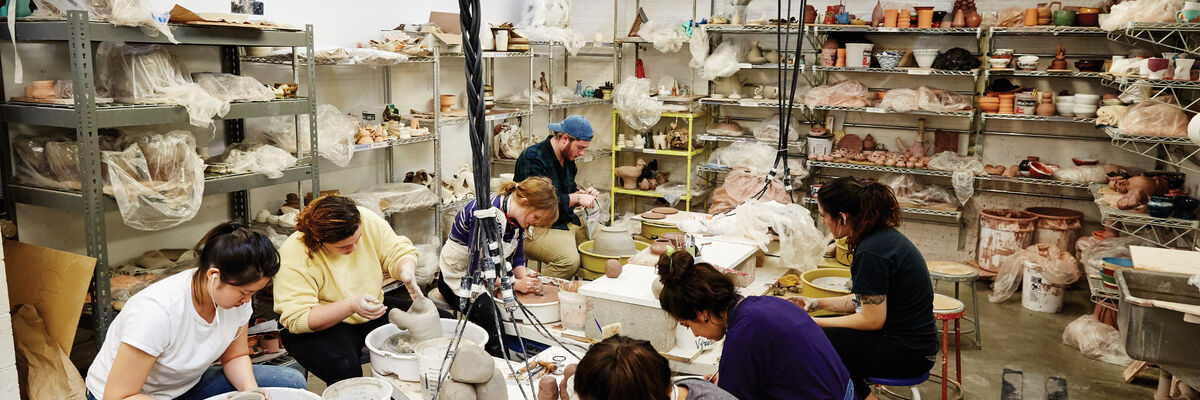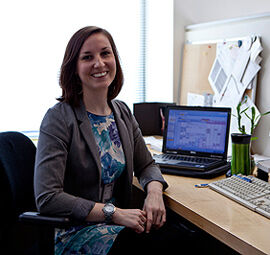
Networking Across Disciplines

In 2009 a small theater company approached the Arts and Business Council of Chicago. The Sideshow Theatre Company had theatrical talent and a growing chorus of rave reviews, but needed an organizational infrastructure to support its quick success. The company became one of the first clients for Arts and Business Council Director of Programs Katie Kurcz (MA 2009). She matched the company’s directors with business consultants from the corporate sector who helped them develop a code of conduct, create budget projections, implement QuickBooks for accounting, and write their first business plan.
"It’s not a one-directional relationship,” says Kurcz. "Our business consultants learn a lot from our arts clients, too. Most come from the corporate sector, while our clients are nonprofits under $1 million, and some are as small as $20,000 annually—so it’s an entirely different scale for them. They learn how to be nimble, entrepreneurial, and creative in solving problems with limited resources. Our business consultants and arts clients develop an enormous amount of mutual respect in working together.”
This type of exchange enriches the cultural landscape in two ways: by helping nonprofit arts organizations to flourish and by exposing individuals working in the corporate sector to the arts. Facilitating these relationships fuels Kurcz’s passion for her job.
The daughter of an engineer and a social worker, Kurcz was exposed early in life to interdisciplinary exchange and the innovative thinking that can result. Her upbringing was influential in teaching her to value a variety of perspectives from different fields.
After completing her B.A. in Public Relations and Public Policy from Syracuse University, she went to work in marketing at Crain’s New York Business while also volunteering at the Museum of Modern Art (MoMA) leading family tours.
"[At MoMA,] our philosophy was creating a conversation with everyone—adults and kids. It was dynamic, and I loved that. I thought if I was going to spend so much time at work, I should do something I really love,” Kurcz explains.
That drive eventually led her to apply to arts management graduate programs. While awaiting her admittance, Kurcz moved to Florence, Italy for a year to run a contemporary art gallery. She returned and enrolled in the Master of Arts in Arts Administration and Policy at SAIC, choosing the school because she wanted to learn administration while surrounded by artists. "I didn’t want to be learning in a vacuum without any opportunity for application—I wanted to be listening to and collaborating with artists,” she says.
In her current role, networking and collaboration with artists is integral to her everyday work. She meets with consultants and clients, learns about their needs and how they work, and helps bring in fresh business talent to meet clients’ needs. "Part of what I got out of SAIC is that the role of the facilitator is not just about getting people together in a room, but really listening to all parties so mutually beneficial relationships can be established,” says Kurcz.
At the Arts and Business Council, Kurcz helps to set the strategic direction for the organization and establish institutional partnerships. Her main responsibility is to recruit business consultants and train them to understand how their skills relate to the nonprofit arts sector. She regularly organizes as well as attends workshops and networking events that engage the community. She works with about 50 arts clients at any given time and maintains a relationship with them as they grow.
In the three years since Sideshow Theatre became Kurcz’s client, the company has tripled its revenue, increased its board two-fold, and broadened its audience. It is one of the stories she uses to illustrate how networking and collaboration can lead to success, growth, and sustainability.
Asked about her advice on how to start networking, Kurcz replies: "Talk to people and get out in the community. I know it’s not easy to find the time because we’re all overworked right now, but it’s so important to build space into your day, week, and month to meet people outside of your traditional circles. If you’re open and curious and initiate conversations, the possibilities to form connections and collaborations are endless.”
